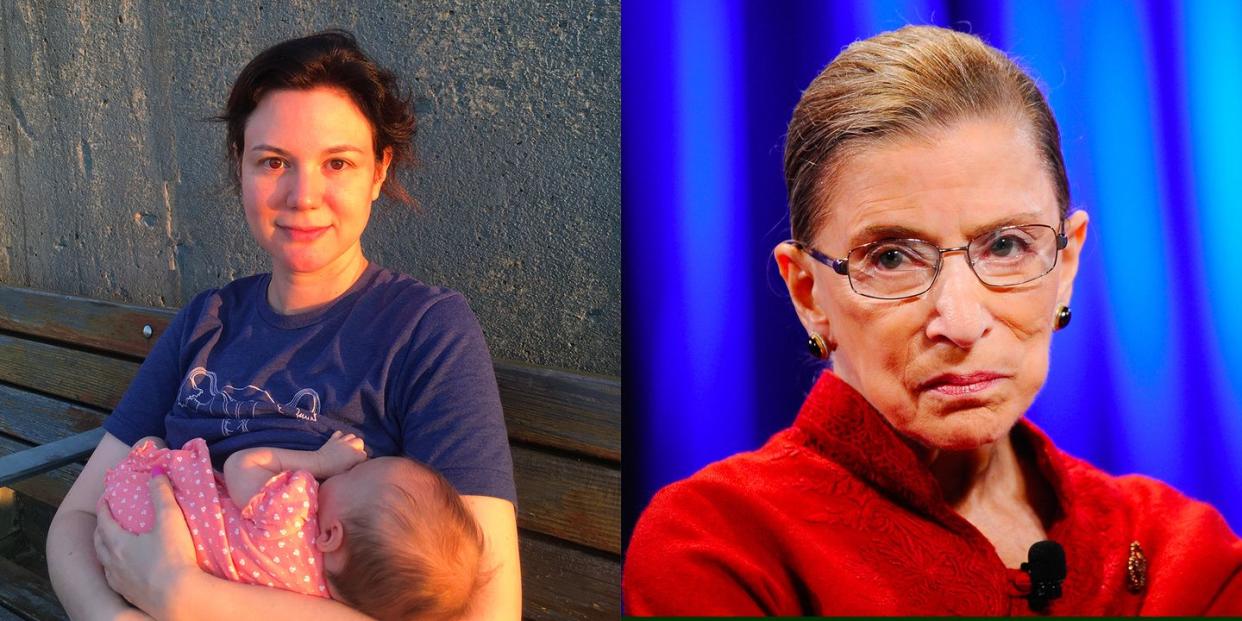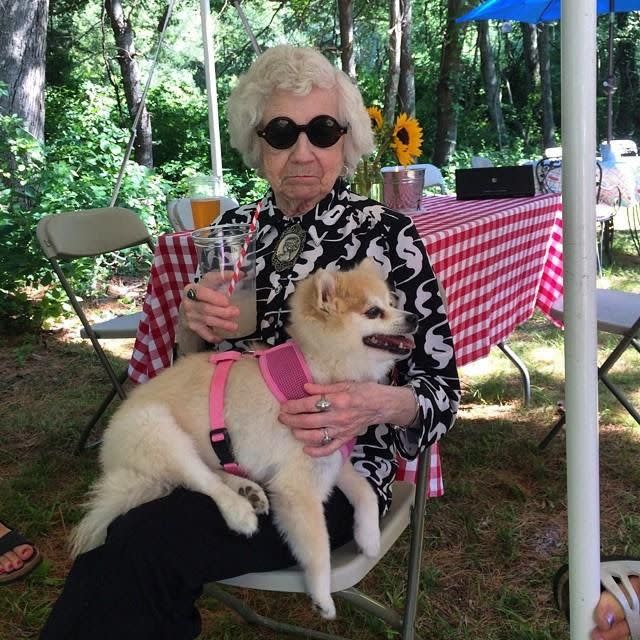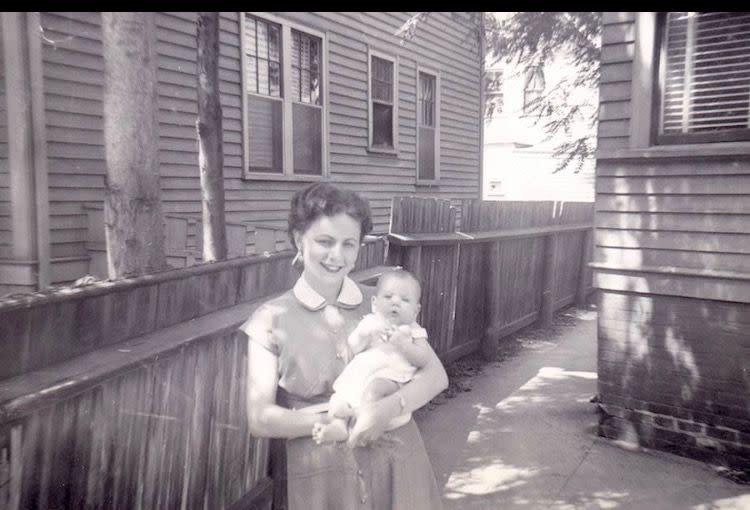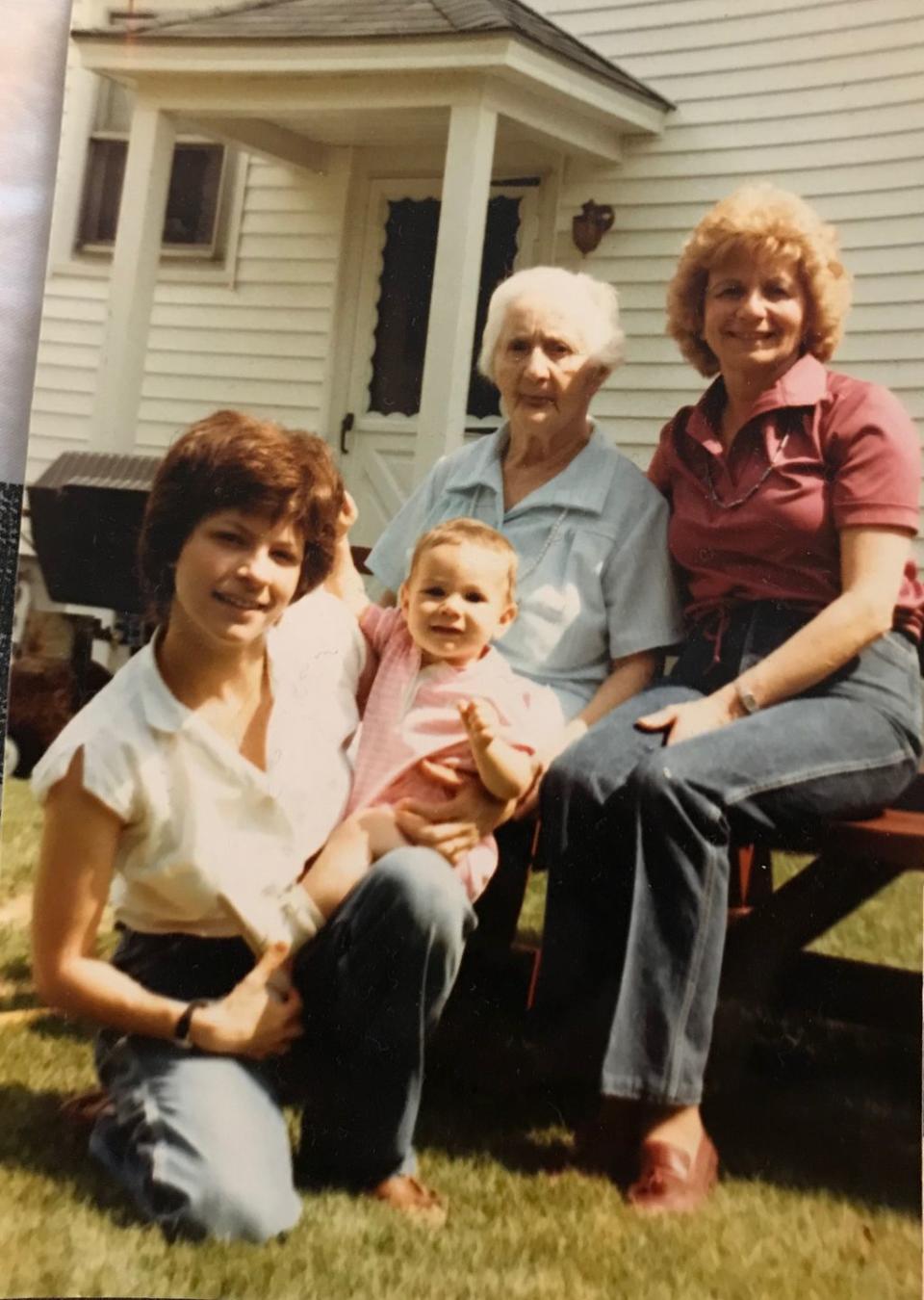I Named My Daughter Ruth to Honor Justice Ginsburg—and My Grandmother

When the doctor told me I was having a girl, I said to my husband, “She’ll be named Joan or Ruth.” At 10 weeks pregnant, I was unsure of everything except that: Joan or Ruth.
“Don’t you think everyone will think we named her after Ruth Bader Ginsburg?” my husband asked. Justice Ginsburg was, at that point, well into her years as a pop feminist icon—the Notorious RBG—and he worried the significance of naming our daughter after my grandmother, also Ruth, might be lost.
“I think I prefer Joan,” he said.
We named her Ruth.
In Hebrew, Ruth means friend. So, I reasoned, my Ruth would be fine having two namesakes. The first was my grandmother, Ruth Goldman, who’d died at 90 years old, the year before I got pregnant in 2018. The second would be Supreme Court Justice Ruth Bader Ginsburg, who died last Friday. I found out about Ginsburg’s death from a ping on my phone—a news alert—and then ping after ping after ping. It was my friends texting me. In group chats, in DMs, we were women devastated by the loss, terrified for what it might mean, mourning collectively on our tiny screens.
Ruth Bader Ginsburg hadn’t always been the rockstar of jurisprudence we know her as now. When she was nominated by President Clinton in 1993, there were many who thought she was an overly conservative pick. In the past, she’d criticized the Roe V. Wade decision, not because she didn’t support a woman’s bodily autonomy (she did, unequivocally), but because she felt the ruling stalled a growing movement for abortion rights and was centered around the physician instead of individual women.
As a junior member of the court, she didn’t take on many of the flashiest cases. Even the case that would make her famous, Ledbetter vs. Goodyear Tire and Rubber Company, wasn’t the most exciting on the 2007 docket. But when the majority ruled against Lily Ledbetter, deciding that she was not entitled to back pay after discovering she’d been paid significantly less than male colleagues for years, Ginsburg donned her dissenting collar and read the minority decision aloud—an unusual move at the time.
“In our view,” she said, “the court does not comprehend or is indifferent to the insidious way in which women can be victims of pay discriminations.” She was speaking on behalf of the three other judges in the minority, but she was also describing herself. She was the only woman on the Supreme Court following Sandra Day O’Connor’s resignation, she’d been one of only nine women in her graduating law school class of 1959, and she’d been demoted by the US Army when she told them she was pregnant. Ginsburg’s point was both larger and more personal: How can a man know what it’s like to be a woman in the workplace? Or, for that matter, the world?

As the news of her death sunk in, my mind went to my first Ruth, my beloved grammy, a Jewish woman who faced down adversity, worked for fifty years as a bookkeeper at a costume jewelry manufacturer, and was the sole breadwinner for her family: my grandfather, Louis, my aunt, Sandra, and my mother, whom we’d lost decades ago.
Her name had been Joan.
And then I thought about my second Ruth, 16 months old, my silly string bean, a ham like her great grandmother already. Her favorite words are “Dada,” “Nona,” (our dog, Mona), and “No.” No is the best of these words, because Ruthie understands it in a kind of existential way I relate to deeply: Yesterday, she was having a snack, and when she realized her bowl of puffs was nearly empty, she held it close to her face and whispered, “Nononononono.”
Like Ruth Bader Ginsburg, Ruthie understands the importance of dissent. Like Ruth Goldman, she understands that happiness—a snack, or, in my Grammy’s case, a decisive victory in duplicate bridge—must be celebrated even though, inevitably, it ends.
I have realized halfway through writing this very essay that all of this is not about the decision to name my daughter after two wonderful women. It’s about the decision I made not to name her after my mother, Joan.

It’s a decision I confronted with Justice Ginsburg’s death, and one I’m admitting to now, for the first time. I’m admitting I worried that if I named my daughter Joan, she might end up like Joan. Joan Goldman Carroll was smart and kind, a mother, and a crusader for what she felt was right.
She was also, in her final months, drug-addicted, a survival sex-worker, and a woman who must have felt very alone and very afraid in a society that offered her no recourse, only scorn. In October of 1984, shortly after I turned four years old, my mother, grandmother, and I went to Temple for Simchat Torah, a jovial holiday in which children can participate that follows the solemnity of Rosh Hashanah and Yom Kippur.
That night, after services, my mother left me with my grandmother Ruth. She went with two of her drug dealers to a hotel room, and they strangled her to death. They did it, one of them later told the police, because they thought she might be a narcotics informer. But also, he added, they killed my mother, Joan, because they decided she was “a real promiscuous piece of shit on account of she had a daughter.” I was—am—of course, that daughter.
And sometimes now when I’m holding Ruthie, when we are cuddled up and reading, or when she is in the bath so small and vulnerable (my stringbean!) I look her in the eyes and tell her: “I will love you forever. I will never ever stop loving you.” And to myself, I think, What if this is it? What if you only have two more years to love her before something happens to you? And that is the part of the reason I didn’t name her Joan. Her name for me is bound up with sorrow, and loss, and overshadowed by the manner of her death. And I’m furious that the men who killed her hold any power over the decisions I make as a mother.

I thought about these men and what they did to my mother, and to my grandmother, and to me—the trauma and horror they dropped into our lives that continues to this day—while watching Brett Kavanaugh pounding his fists, red-faced, telling Congress that the judicial nominee process was a farce. I thought about how men and women seemed to interpret his aggression differently. I thought about Trump saying it was a “very dangerous time to be a man.” And like so many other people, I cried. I cried out of frustration, and I cried because, just as Ginsburg had pointed out that a man could never know what it was like to be a woman in the workplace, those in power would never understand what it was like to feel powerless to the whims of powerful men.
On the opening day of the Supreme Court last year, Justice Ginsburg wore one of her signature collars. This one had a torah verse on it that read “Tzedek,” which means “justice.” The concept of justice and the practice of living a just and righteous life is difficult. But it’s a way to raise my daughter in an unjust world and to teach her that no justice means no peace. Justice is something you have to fight for. The power structures that hold our government together are broken; they were never truly righteous to begin with. The legislative branch is included in that indictment. But I don’t have it in me to be cynical about the hope that one woman can inspire. And that is why Ruth will grow knowing the power and legacy of her name, and of the two incredible women she shares it with.
After Ginsburg’s death, I found out something else about her name. She’d been born Joan Ruth Bader, taking on Ruth when she entered high school. Before everything, she was Joan Ruth Bader. My mother’s name, my grandmother's name, my daughter’s name, and the name my daughter might have had if I’d been a bit braver and a bit less superstitious.
In reform Judaism, the concept of an afterlife, and of heaven and hell is murky. What’s understood, in an informal way—especially for a primarily non-observant Jew like me—is that human life is meant to be finite and impermanent. What we have, and what we cherish, are our memories of the dead. And so we go out into the world with those memories and are charged with making it a better place.
“May her memory be a blessing,” I was told over and over by friends and family as we sat shiva for my grandmother two years ago. For Ginsburg, an alternate version of this phrase has gained popularity. It began in Israel to mark the deaths of those lost to hate crimes and domestic violence, and I think it’s the rightful way to honor Supreme Court Justice Joan Ruth Bader Ginsburg:
“May her memory be a revolution.”
Leah Carroll is the author of Down City: A Daughter's Story of Love, Memory, and Murder.
You Might Also Like

